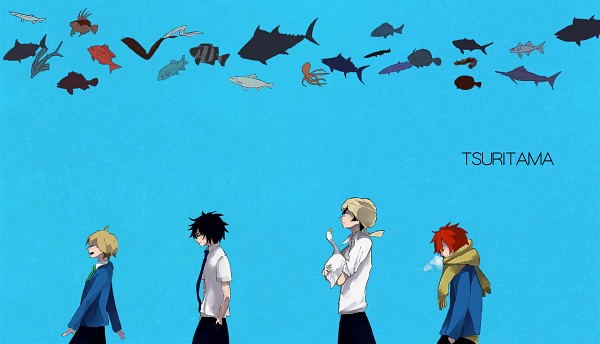“Tsuritama” is an animated show about fishing, but from that phrase alone we can infer that the scope of its subject matter will be much larger than that. Fishing, like hunting, has become intertwined with more and more symbolic meanings and romantic associations as fewer and fewer people have to fish in order to live.
Consider Hemingway’s “The Old Man and the Sea,” which if you read it in a high school English class would seem to be about everything except fish. Likewise, in “Tsuritama,” the all-male cast of protagonists actualize themselves and mature into adults by the strength of their rods and sinkers.
What sets “Tsuritama” apart from Hemingway and other works exploring fishing as a metaphor, however, is twofold: it is — for most of its running time — a quieter, less heroic slice-of-life drama, and its other main source of inspiration appears to have been “Men in Black.”
Yes, this is not just a fishing show. Rather, it is a fishing show featuring aliens and the secret agents who surveil and hunt them for the good of earthlings everywhere. Taking place on the Japanese island of Enoshima, the show follows socially inept and half-French Yuki, mind-controlling alien naïf Haru, expert fisher Natsuki and the mysterious Akira.
While the first half of the show narrowly focuses on Yuki’s often abortive attempts at learning to fish under Natsuki’s tutelage, the show keeps its extraterrestrial conspiracies close at hand, so that the introduction of a potential dance-based apocalypse into the plot feels less jarring and more organic.
Even during the much busier and louder later episodes, the story continues to develop the characters toward satisfying ends. Social awkwardness and impulsive behavior are the connective tissues between the beginning and end, letting the show’s creators ground both the lighter comedic and heavier dramatic aspects of the show in a sense of human reality.
Unusually for an animated show from Japan, “Tsuritama” takes real stock of its characters’ racial and, yes, planetary identities. Most of the cast is coded as outsiders struggling to break in, with the half-European Yuki and Indian Akira perpetually caught between belonging in this idiosyncratic island community and confronted by their metaphorically alien natures.
Haru, as an actual extraterrestrial, has his own challenges, integrating into human society, though his palpably buoyant personality usually smoothes out trouble. These themes are subtly woven into the script. The visuals of the show alongside the more obvious and standard tropes about friendship and maturity work in this genre. Like the story itself, it is the balance of the enigmatic, the familiar and the known that works in the show’s favor.
Most importantly, however, “Tsuritama” possesses a bright and beautiful look. While hardly a showcase for complex editing or animation, the show boasts attractive, distinctive character designs and a summer look that emphasizes primary colors. Most of the animation is fluid and there are a few spectacular moments awaiting viewers who make it through the breezy 12-episode run.
A particularly important cast of the rod distorts reality itself, and the show is not embarrassed for its carnivalesque absurdities. This sense of narrative and visual conviction drew me in, and despite its oddities I would wager the story holds appeal for all sorts.
Though the summer has ended and our thoughts now turn toward the cold and gray winter months, “Tsuritama” embodies the vitality of the best summer memories so well that it can likely break through a few clouds by sheer force of personality. The show is currently available in both English and Japanese on DVD and Blu-ray, and you can also watch it in Japanese on Crunchyroll.






